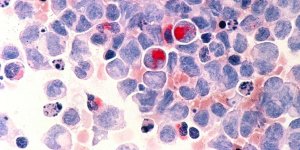| Health / Health News |
Black fungus stalks COVID-19 patients in India
A fungal disease called mucormycosis is emerging among hundreds of COVID-19 patients in India, placing further strain on hospitals already at breaking point.

A woman undergoes a check-up. The new strain of COVID-19 virus can cause patients’ blood sugars to shoot up, creating a suitable environment for mucormycosis. Photo: Trinity Care Foundation
The US Centers for Disease Control and Prevention (CDC) said that mucormycosis, also known as black fungus, is a “serious but rare” infection caused by a group of moulds called mucormycetes. It usually affects the sinuses or lungs after fungal spores are inhaled from the air but can also occur on the skin after a cut or burn.
The Indian government has not yet announced the number of mucormycosis cases among patients with COVID-19, but media reports say there are more than 400 victims in Gujarat, 200 in Maharashtra and several others in the hospitals of Delhi, Bengaluru and Hyderabad cities.
Diptendra Sarkar, a COVID-19 strategist, public health analyst and professor at the Institute of Post Graduate Medical Education and Research, Kolkata, India, tells that extensive use of immunosuppressant drugs for the treatment of COVID-19 may be responsible for the rising incidence.
“This is more common amongst diabetics, transplant patients, prolonged high-dose steroid recipients and patients on cancer chemotherapy,” Sarkar explains. “Though the incidence is sporadic, busy ICUs [intensive care units] can become epicentres for the surge in [mucormycosis] cases and create a huge challenge to health resources.”
According to Raghuraj Hegde, consultant eye surgeon at Manipal Hospital, in Bengaluru, India, the virulence of the new strain of COVID-19 virus causes patients’ blood sugars to shoot up, which in turn provides a suitable environment for mucormycosis. “The steroids used in COVID-19 treatment possibly add fuel to the fire already raging,” he tells.
On 8 May, a tweet from the Gujarat Chief Minister’s Office said that the state government has decided to start separate wards for mucormycosis patients at civil hospitals in Ahmedabad, Vadodara, Surat, Rajkot, Bhavnagar, and Jamnagar.
The government has also ordered 5,000 injections of the antifungal drug amphotericin B to treat mucormycosis. (SciDev.Net)
YOU MAY ALSO LIKE





